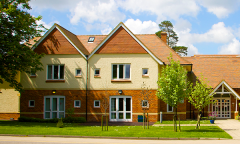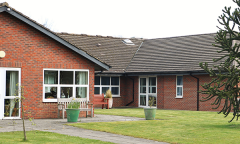We offer care and support in residential, nursing and supported living services. Each home provides a relaxed and friendly atmosphere, and people we support are empowered to live as full a life as possible within a supportive environment.
Most of our services are modern and spacious, offering individual bedrooms with en-suite wetrooms and/or assisted bathrooms. All homes have communal living and dining rooms alongside large enclosed gardens which are set in beautiful rural surroundings.
Our residential care services have 24 hour access to nursing advice and support for epilepsy related issues. Immediate medical support is available in the event of a medical emergency. Where possible, we aim to manage seizures within the home environment, preventing unnecessary epilepsy-related hospital admission.
People we support have access to a multidisciplinary team. This team consists of neurologists, nurses, physiotherapy and occupational therapists, speech and language therapists, complementary therapists, and a GP. General health needs are also met by this team. We also offer care in your home and a supported living service.
All our homes are regulated by the Care Quality Commission
Micholls House
Micholls House is all about individualised care and empowerment. Residents are encouraged to be involved in all decisions about their lives - what they choose to eat each day, what they wear, what activities they take part in, what trips they go on and whether they choose to use our on-site health services or their own.
Morton House
Morton House is a care home for up to 14 adults. The staff provide personal and social care based on individual choices and preferences.
Croft Cottage
Croft Cottage provides a small homely environment for seven adults with complex epilepsy, associated impairments and learning disability.
Russell House
At Russell House we are dedicated to empowering residents and enabling them to do as much as they can, and make as many decisions for themselves, as possible.
Queen Elizabeth House
Our specialist nursing care for adults with epilepsy is provided in Queen Elizabeth House at our Chalfont Centre in Buckinghamshire. In addition to their epilepsy, residents often have associated and additional complications, including physical and learning disabilities, brain injury and autism.
Greene House
Greene House is a care home for up to 10 adults. The staff provide personal and social care in person centered way.
Steps
Our supported living service is available to adults with epilepsy who may also have other associated or additional complications. The service provides people with the opportunity to live with greater autonomy and independence in the community.








